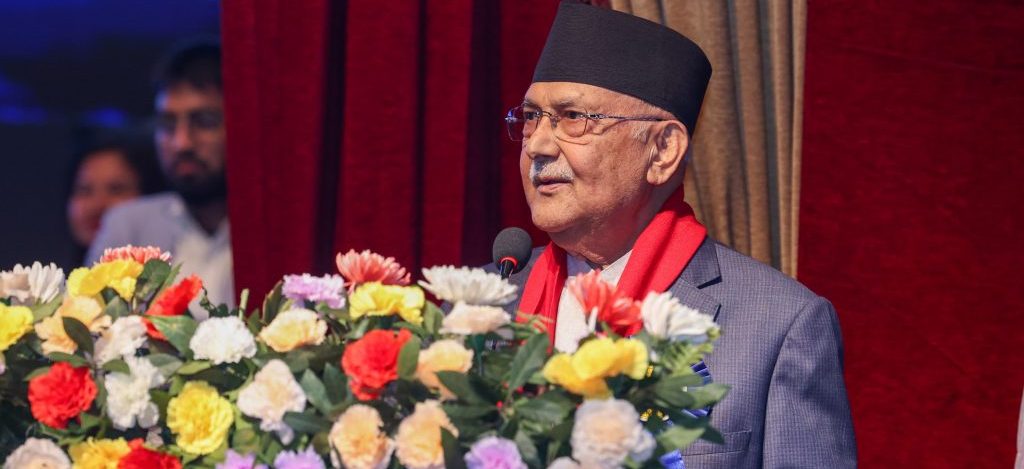

KATHMANDU: Prime Minister KP Sharma Oli has lauded the role of civil society organizations in awakening society, urging them to focus on the development and promotion of entrepreneurship.
Inaugurating the National Civil Society Conference-2081 BS organized by the NGO Federation here on Monday as the chief guest, the prime minister advised civil society organizations to encourage citizens to engage in entrepreneurship for self-sufficiency and to reduce dependency on external grants.
He also sought the roles of civil society organizations in promoting production and productivity. The head of the government said livestock and agricultural activities assisted by available technology will lead us to economic empowerment.
Celebrating socioeconomic and political achievements that Nepal has made in the country, especially after the 1990s political movement, the Prime Minister argued that Nepal presents an exemplary set regarding the empowerment of women, and their representation in politics, which is above 40 percent in the local-level government.
He also utilized the time to alert that due to wrongdoing on the part of some people, questions have been raised over the presence of some civil society organizations. Also speaking on the occasion, CPN (UML) leader and former Minister for Foreign Affairs Pradeep Gyawali expressed his dismay at the decision to suspend the USAID funding to Nepal.
“It is not the charity of the rich countries to provide funding for development to the least developed countries; instead, it is their responsibility.” A strong international partnership must be established for countries like Nepal. It is the rightful demand of third-world countries to receive financial support from developed nations, especially in light of the exploitation of their resources for the accumulation of wealth in these developed countries, according to him.
Former Minister for Foreign Affairs, Dr. Bimala Rai Paudyal, stressed the need to use available funds according to national priorities and needs. She stressed that the guarantee of economic resources remains a significant challenge for civil society organizations in their quest for sustainability.
Acknowledging that donors’ funding interests may sometimes influence civil society deliveries, she called for transparency, good governance, and commitment to serving the intended goals. Moreover, Dr. Paudyal urged that the Social Development Act be enacted without delay and the Associations Registration Act of 1977 (BS 2034) be revised to address legal challenges facing civil society organizations.
EU ambassador to Nepal, Veronique Lorenzo, said, “The world right now isn’t business as usual; it is a business exception.” Won Young Hong, UNFPA Representative, said, “CSOs are champions of democracy, defenders of human rights, and the backbone of accountability.
Thus, we must protect civic space instead of restricting it.” Civil Society Leaders’ Perspectives Noted civil society leader Taranath Dahal asserted that civil society organizations should be treated as “partners” of the state, not as mere “aides.”
He advised civil society organizations to shift from a “funding” approach to a “freedom” approach. Dahal urged the state to recognize CSOs as professional agencies, not as subordinate support entities. He also urged civil societies to strengthen their movements and make their voices heard, calling for a vibrant presence and greater advocacy for their causes.
Nirmala Sharma, Chair of the Federation of Nepali Journalists (FNJ), echoed similar sentiments, stating that the FNJ stands with civil society movements for transformation. She highlighted that freedom of opinion and expression, as enshrined in the Constitution, should remain inviolable under any circumstance.
Sharma called for unity among civil society organizations to protect and uphold the core values of democracy. Dr. SP Kalaune, Chairperson of the Association of International NGOs (AIN), described civil society organizations as the heartbeat of democracy and emphasized the need for them to be treated accordingly.
Ram Prasad Subedi, President of the NGO Federation, called for clear and prompt government policies and laws regarding the registration and regulation of civil society organizations. He also expressed concerns about the challenges CSOs face in dealing with various taxes and registration fees at the local and provincial levels.
Subedi urged the government to address these issues promptly. Additionally, he reiterated the commitment of CSOs to explore entrepreneurship, create jobs, and contribute to the prosperity of the nation through income generation, particularly in alignment with state priorities in social sectors.
Representative voices from delegates Seventy-eight-year-old Krishna Prasad Baral from Pokhara, as a delegate, expressed his concern over the ongoing political scenario in the country. Talking to the RSS, the former government employee lauded the contribution of civil society organizations in the social awareness sector, wanting them to work further for the enhancement of democracy.
Dr. Radha Paudel said she highly felt the necessity for CSOs to broaden their areas of work and intervene in menstrual discrimination as well. “The NGO Federation should forward dignified menstruation for ending all sorts of discrimination, including caste-based discrimination, fostering inclusive equality, and strengthening democracy.”
Launch of the Nepal Country Inequality Report 2025 On the occasion, the Nepal Country Inequality Report 2025 was launched. The report places strong emphasis on climate justice, illustrating how climate change and related disasters disproportionately affect vulnerable groups, exacerbating existing social and economic inequalities.
One of the key findings of the report, produced jointly by the NGO Federation and OXFAM Nepal, is that income inequality remains a pressing issue in Nepal, with the top 20 percent of earners experiencing income growth that far outpaces that of the bottom 20 percent, further widening inequalities.
Assets and non-agricultural enterprises constitute a significant income source for the richest households, as a result of which, Nepal’s richest 10 percent earn significantly more than the total income of the poorest 40 percent.
The two-day conference attended by 900 participants, including civil society organization representatives from across the country, coincides with the 11th General Convention and 30th AGM of the Federation.